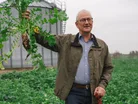Carlsberg Advances Sustainability with Regenerative Barley

Carlsberg has recently embarked on an innovative agricultural venture in Denmark, focusing on regenerative farming practices. The move is part of a broader commitment to source all raw materials in a regenerative manner by the year 2040.
In collaboration with agricultural cooperative DLG and malting firm Viking Malt, Carlsberg is moving towards sourcing malt barley exclusively grown in Denmark under regenerative farming guidelines. This approach is geared towards revitalising the ecosystem, ensuring biodiversity and enhancing soil health while concurrently maintaining robust crop yields.
Regenerative agriculture, which Carlsberg is adopting for its barley cultivation, involves a series of practices designed to improve the farming environment. These include minimal tillage, keeping the soil covered throughout the year, rotating at least three different crops over five seasons and minimising the use of synthetic fertilisers and pesticides. From just two farms in Zealand, where Copenhagen is located, Carlsberg has already harvested 100 hectares of barley, which will eventually produce about 500 tonnes of malt. This quantity of malt is capable of brewing approximately 3.3m litres of beer.
This harvested barley isn't just for brewing any beer; it's set to contribute to a special edition Carlsberg beer, which will be brewed entirely from regeneratively grown barley and released in 2025. The bulk of this malt, however, will be used for Carlsberg's flagship Pilsner, gradually transitioning it to be brewed with 100% regenerative ingredients.
The strategic edge of regenerative farming for Carlsberg
Peter Haahr Nielsen, the CEO of Carlsberg Denmark, underscores the strategic significance of this initiative.
"Around 24% of Carlsberg's Danish CO2e emissions come from agriculture, which supplies the raw materials for our various products," he said. "We, therefore, see great potential in converting to regenerative agriculture to reduce our CO2e emissions and to contribute positively to biodiversity."
It slots into Carlsberg Group's overarching sustainability blueprint, named 'Together Towards ZERO and Beyond', which incorporates regenerative farming practices previously introduced in countries like the UK, France, and Finland. Central to Carlsberg's ethos, this move is pivotal for integrating sustainability into its operations right at home in Denmark.
"We, therefore, see great potential in converting to regenerative agriculture to reduce our CO2e emissions and to contribute positively to biodiversity," he added.
However, implementing regenerative agriculture in Denmark represents a significant challenge and a substantial shift from conventional farming methods. This lack of an established standard for regenerative materials and practices implies a need for creating tailored criteria suitable for the Danish agricultural environment.
Bøje Kjær, Executive Vice President of DLG Denmark, sees the broader implications of this initiative.
"There is a huge business potential for regenerative crops, which we believe is an important part of the transformation that agriculture is facing," he said. “The next step is to get more food companies on board who can see the same added value as Carlsberg and Viking Malt."
Carlsberg's collaboration and innovation in agriculture
To tackle these challenges, Carlsberg has teamed up with Agrovi, an agricultural consultancy, to define specific requirements for regeneratively grown raw materials in Denmark. Collaboration throughout the agricultural value chain is vital to evolve and refine regenerative practices within the country.
This isn't just about enhancing sustainability. Adopting regenerative methods offers much-needed resilience against the impacts of climate change. By fostering healthier soil and more biodiverse agricultural systems, regenerative practices equip farms to better withstand adverse weather conditions like droughts and floods. Such resilience is crucial for ensuring consistent, quality barley supplies for brewing.
For the beer lovers, rest assured, the transition to regenerative agriculture won’t alter the taste of Carlsberg beers. The malt produced via regenerative methods meets the rigorous quality standards required to maintain the flavour profiles that consumers expect from Carlsberg.
Looking ahead, Carlsberg Denmark intends to upscale its commitment to regenerative sourcing. This commitment is not just about transforming Carlsberg's own operations; it also aims to influence broader industry practices, potentially setting a trend for sustainability across the Danish food and beverage sector.
Carlsberg hopes that its commitment will not only enhance its sustainability credentials but also catalyse a shift towards more eco-friendly practices across the industry and beyond, fostering a more sustainable future for global agriculture.
"There are several challenges to overcome in the coming months and years, including common principles," said Simon Boas Hoffmeyer, Senior Director of Sustainability & ESG for Carlsberg Group. "We need scale to increase impact. For this to happen, we need more value chain partners and crops to join the transition."
Make sure you check out the latest edition of Food Digital and also sign up to our global conference series - Sustainability LIVE 2024
Food Digital is a BizClik brand




